John Amos and a Family at War With Itself
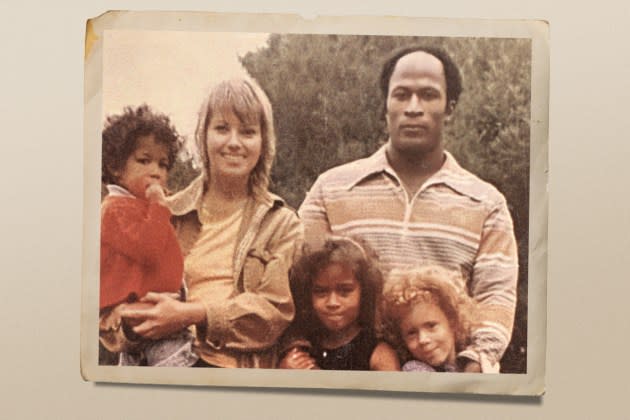
In July, TV legend John Amos’ 53-year-old son, K.C., ended up in a New Jersey jail after his 57-year-old daughter, Shannon, claimed that K.C. had sent her “terroristic” threats over text message that made her believe that her life was in danger, according to a police report. These included a photo of a rifle with a caption explaining that it “can clean a turkey out from 3 football fields away.”
It was the latest in a series of sensational, headline-grabbing episodes involving the siblings this year. They’ve been locked in a bitter dispute over their father’s care, with accusations of elder abuse slung in each direction. Yet behind the scenes, The Hollywood Reporter has learned through discussions with all three Amoses that the situation is both more and less than it seems.
More from The Hollywood Reporter
The painful saga goes back decades and provides an unsettling X-ray on the family life of a man who became an icon, especially among generations of African Americans, for playing the paterfamilias James Evans Sr. on Good Times. The claims and counterclaims conjure Gothic drama: infirmity, obsession, revenge, deceit, madness.
Each of the kids — he a music video director and editor, she an entertainment executive turned medicinal healer — believes they’re innocent and the other is nefarious. Their 83-year-old father, who has in the past toggled his trust between his offspring while making clear he loves them both, detests that his family life has become gossip fodder. “Whatever we’re going through is our business, not the business of the public,” he says. Yet the warring siblings, in their attempts to vanquish each other, have shown a common willingness to trump that desire for privacy by leveraging social media platforms and, in their dealings with THR, by putting forward confidential documentation to press their respective cases — even if it might undercut or embarrass their father.
For all their differences, both K.C. and Shannon understand the value of storytelling. Their father impressed upon them that if they must work in Hollywood, they should stay away from acting and instead pursue behind-the-scenes careers where they might be the ones making the true creative decisions and determining the framing of narrative visions.
In this battle, they’re each pitching. “Seventies sitcom star in trouble when his bipolar, drug-addicted son exploits him on TikTok and his ayahuasca shaman daughter comes to the rescue,” Shannon says, drafting a logline. “That’s what it looks like. It’s crazy.” For his part, K.C., invoking and appropriating his father’s most prestigious starring role, as the enslaved protagonist of Roots, notes of his several-day stay in the New Jersey jail that resulted from his sister’s accusation: “It’s true false imprisonment. I became Kunta Kinte.”
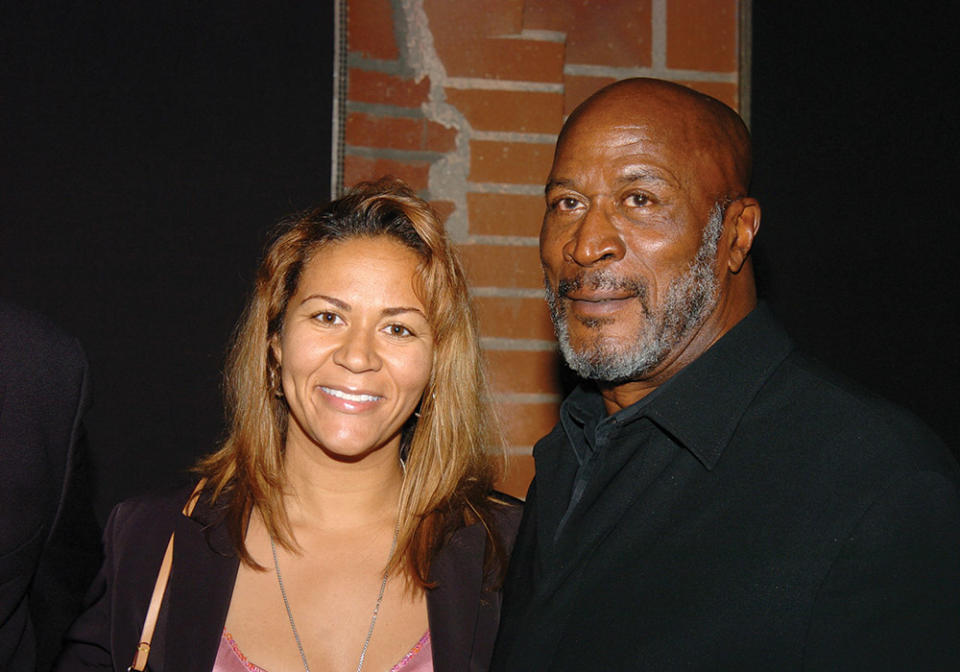
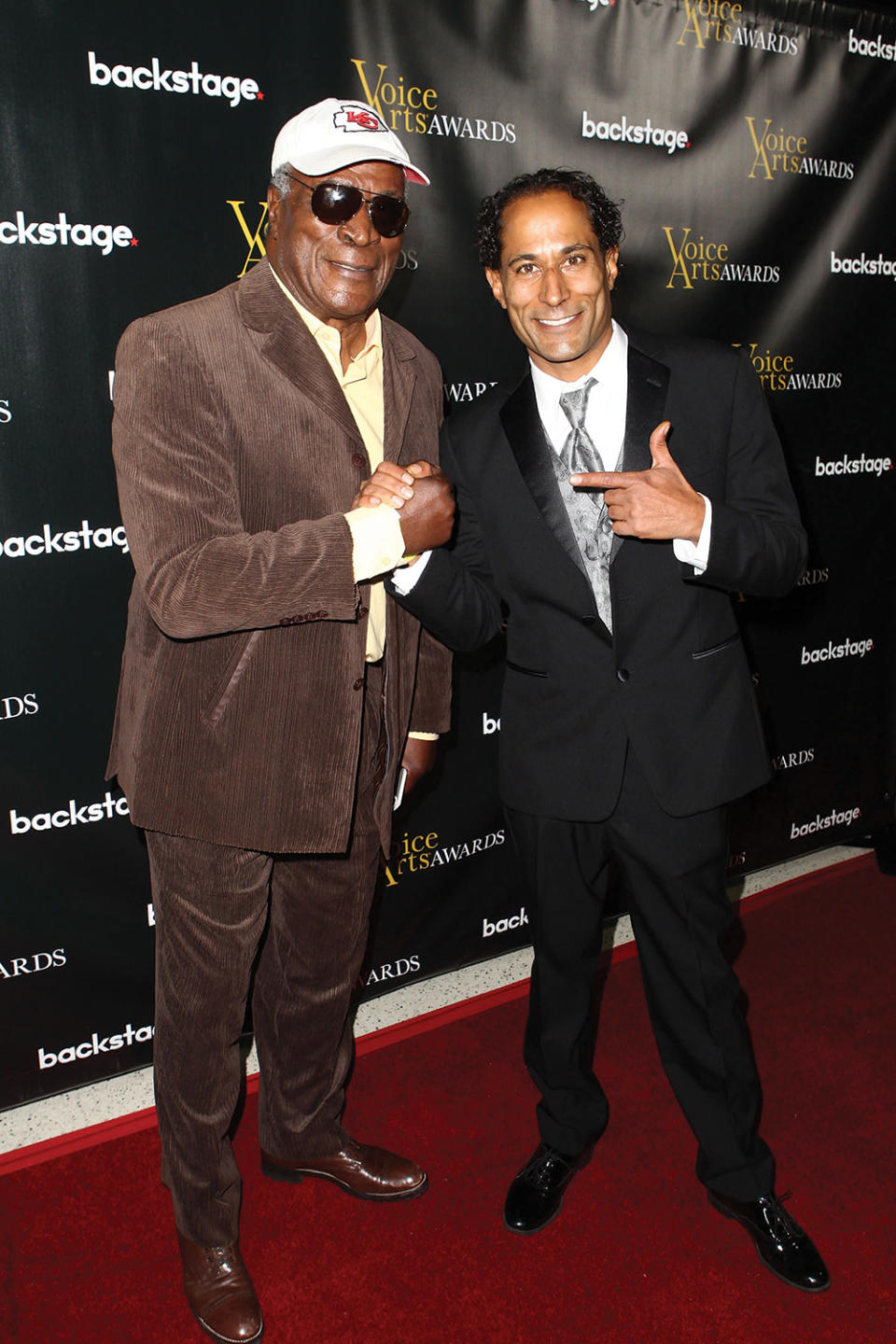
***
Since earlier this year, John Amos has been traveling the country with K.C. On TikTok, his son has depicted their journeys like a buddy comedy while Shannon and other members of the actor’s personal and professional circles have regarded the spectacle with unease, especially because it has included stays at medical facilities in multiple states.
In October, they arrived in Los Angeles to take business meetings. Soon after, THR met them for lunch at a Marina del Rey hotel. K.C., in a psychedelic shirt and Wayfarers, vacillated between being solemn, upset and as casually loose as he appears on TikTok — where he’s amassed almost half a million followers by posting a substantial amount of content involving his dad. John, in a wheelchair, was a far more even-tempered presence, fielding questions in his signature dignified baritone with a no-nonsense sharpness, although he nodded off half an hour into the conversation, prompting his son to gently nudge him. Asked about his health, he replied: “I’m feeling pretty darn good for 83 years of age.” (Later in the month, a photo shoot for this story was canceled after he was admitted to Cedars-Sinai, for what K.C. described as fluid retention issues; Shannon contends this has to do with John’s heart and is evidence of her brother’s alleged neglect.)
Father and son were intent on making several things clear. They’d been immensely enjoying their time together, bonding over their love of the Grateful Dead and the ongoing filming of a feature-length documentary about John, titled America’s Dad, which K.C. is directing. They hoped to soon close on an oceanfront property in Jamaica, which would serve as a sort of home base — although John, who reprised his role as Cleo McDowell in the 2021 sequel Coming 2 America, had no plans to stop booking acting gigs in his ninth decade: “To spend the rest of my life sitting there, contemplating the waves? Not when there’s so many stories to tell.”
They didn’t see the fuss that some of those close to them had made about recent TikToks being too silly or debasing or just generally cheapening of John’s stature. (Several of those same individuals reiterated their concerns to THR, although they declined to state them on the record, out of concern for further straining their relationships with the actor.) The duo saw them as lighthearted vignettes — riffing on an old Three Stooges skit, lip-syncing to McFadden & Whitehead’s “Ain’t No Stoppin’ Us Now” — and didn’t mind the perks of being influencers. “A gentleman sent us a $1,700 walker,” K.C. noted. “We’ve been offered top-of-the-line Jacuzzis, top-of-the-line lounge chairs.”
They said they’d abandoned the rural, high-altitude town in Colorado where John had been living since 2018. For one, the thin air was contributing to his respiratory challenges. For another, they’d become convinced that he’d been the victim of financial predation by a group of people he knew there.
When together, there was minimal daylight between them regarding Shannon. K.C. noted that Shannon had been “a bully” to him since they were children, but declined to otherwise speak ill of her. John, ascribing their dynamic to “sibling rivalry,” wouldn’t do so, either. “I love my daughter; she’s very bright,” he said. “In the final analysis, I think she means well, even if she might be going about this in the wrong way.” He noted that there are often differences between family members. “Most times it’s less than what’s been going on here.”
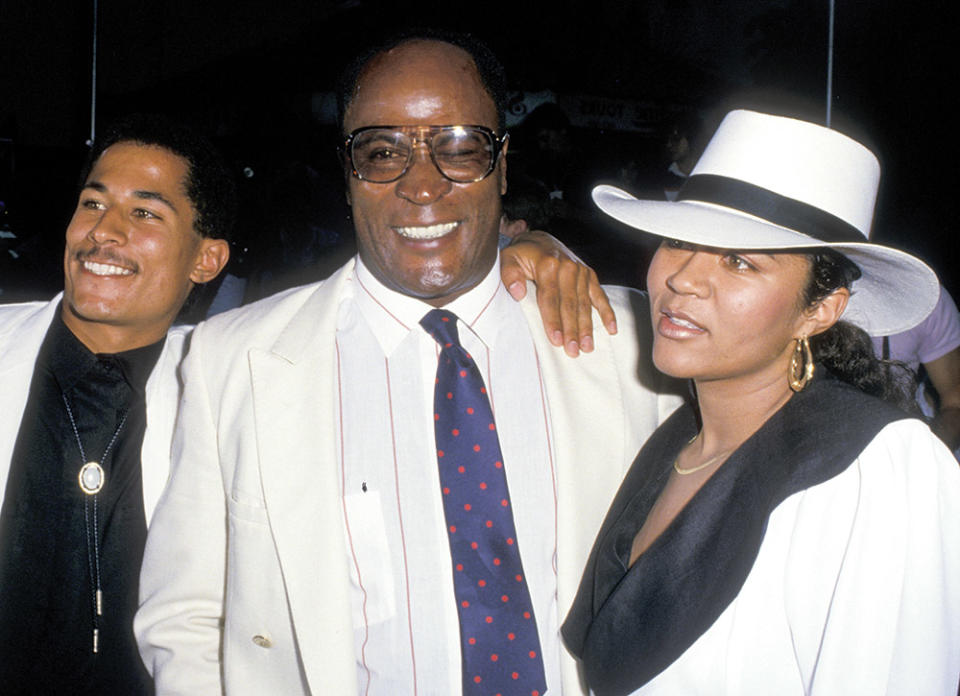
Afterward, however, K.C. sent THR an unsolicited video clip of John speaking to Shannon while seated on a hotel room toilet (the camera was surreptitiously recording through a crack in the doorway), as well as audio of an hourlong June 2023 call between his father and lawyers in which the actor minced no words about his daughter. “I have reason to believe that I’ve been taken advantage of financially, emotionally and every way that you can imagine as an elder, and I attribute most of this maltreatment to my daughter, Shannon Amos, who is estranged from me,” he said, adding that he’s aware of her efforts to “falsely” vilify K.C. “The aspersions that she’s cast on my son are lies, and we’ve got to combat that. We can’t just sit back and be passive. I want to stop it, nip it in the bud.”
Shannon rejects the accusations out of hand: “My brother has been brainwashing him.” John’s goddaughter Amy Goudy, who spoke with him shortly after K.C. first circulated a short clip of the call this past summer, said the actor claimed no recollection of speaking so vehemently against Shannon.
***
Shannon and K.C., John’s only children, are from his first marriage, to Noel “Noni” Mickelson, whom he met at Colorado State University. Noni was white, a Jew from a small town in Iowa who’d majored in fine arts. They wed in 1965, two years before the Supreme Court’s landmark Loving decision, which ruled against laws banning interracial marriage.
After graduation, the couple moved to John’s native New Jersey and earned their living as social workers. An artist and free spirit, Noni encouraged her husband’s performing aspirations when his first dream — playing pro football — foundered. He broke into the Greenwich Village stand-up scene and then, more lucratively, the entertainment industry. “Being an artist herself, she understood my reluctance to accept the 9-to-5 world,” John said. Noni moved with a young Shannon to Los Angeles as John booked TV commercials and then the one-two punch of sitcoms that would make him a household name: weatherman Gordy Howard on The Mary Tyler Moore Show, followed by James Evans Sr. on Good Times.
The Amoses raised their kids in Sylmar, on a property featuring horses (Noni was a talented equestrian) that bordered a bucolic expanse of the northern San Fernando Valley. At first, this was an idyll of pool parties and cookouts populated by the likes of Ben Vereen and Margaret Avery. Then it wasn’t.
“When he was working he was the best dad, and when he wasn’t he’d spiral into rages,” Shannon explains of her father. She remembers him self-medicating for old football injuries as well as emotional pain throughout her childhood by smoking cannabis and ingesting Vicodin, Valium and oxycodone. K.C. was too young to remember.
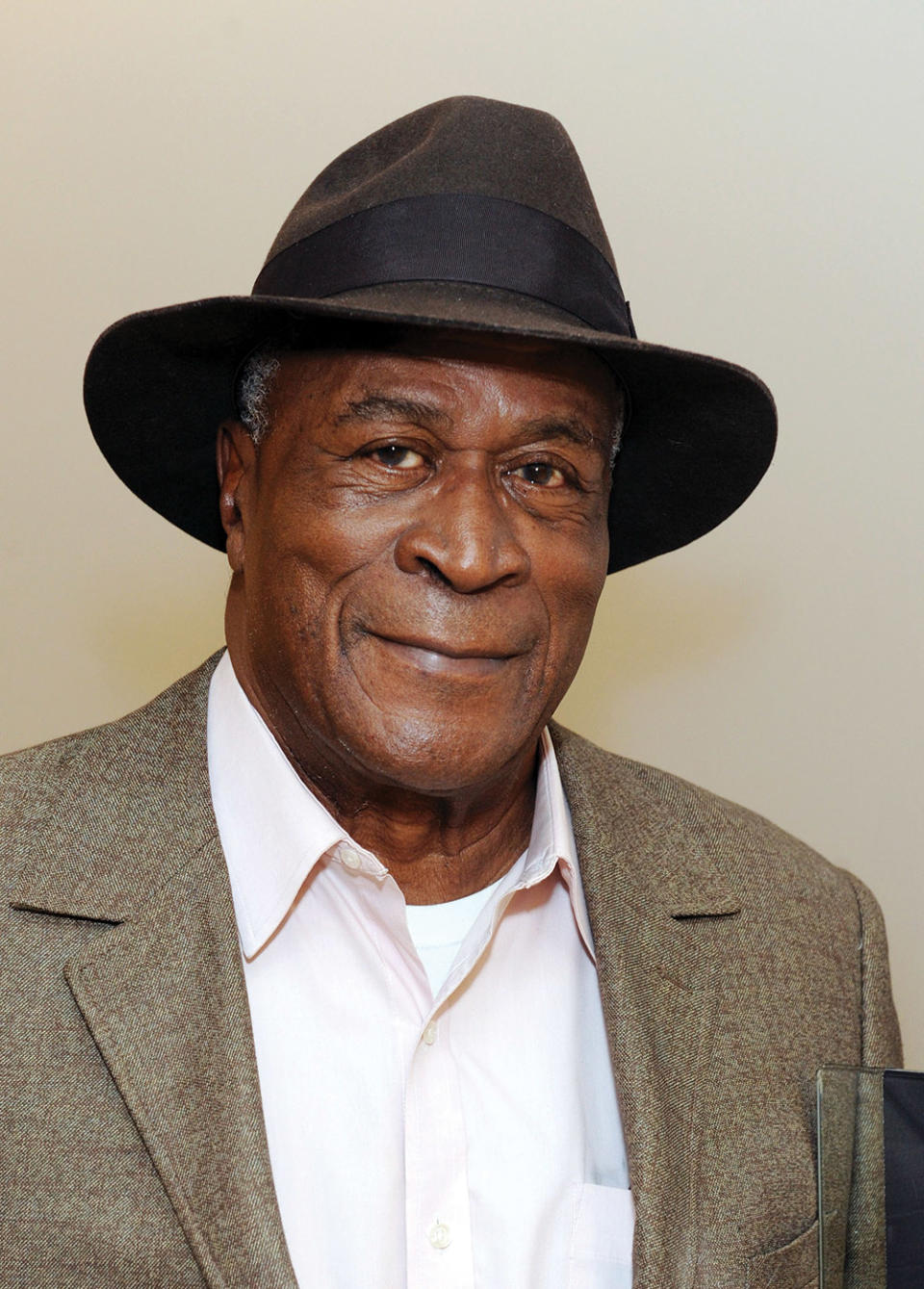
Shannon, 9 years old when her parents separated, recalls Noni losing hair, weight and maybe sanity. (“I think my mom had a nervous breakdown.”) K.C. — intelligent and introverted, sensitive and skinny — retreated around his larger-than-life, largely absent father, who moved in with his second wife, actress Lillian Lehman (L.A. Law, General Hospital). Stronger-willed Shannon says John could be playful, funny and supportive, as well as threatening and even brutal. She remembers receiving a black eye on her 13th birthday after telling him he was violating Noni’s restraining order by appearing on her property. In response, John said it’s “not in my DNA to disrespect women.”
Racism had been an asymmetric burden during John and Noni’s marriage. “She didn’t really see the world in black-and-white; she was very naive,” Shannon says. For John, who spoke privately as well as publicly about his frustrations with the characterization of African American life on Good Times (he was written off the show after its third season), it was a constant torment, whether at a gas station or in renting an apartment or on a family road trip or — long after becoming a TV icon — in meetings with Hollywood decision-makers. “He would be told that he was too Black, he was too ugly, his nose was too big,” says Shannon. “They’d talk about him like he was an animal. Even though he’d been in, like, 70 projects, he’d still be asked to read. He’d be so upset. His white peers would just be called in at that point.”
John discouraged his kids from following in his acting footsteps. When they persisted in showing interest in the business, he guided them behind the scenes, where he believed they could attain and wield real power. K.C. had a promising start as a director, landing a Grammy nomination for best longform music video (James McMurtry’s “Where’d You Hide the Body”) in 1996 and then seeing a short earn an honorable mention at the 1997 Sundance Film Festival. He went on to develop a career in music videos for artists including Mack 10, Lil Wayne, Rick Ross, Fat Joe and Big Pun.
Meanwhile, Shannon worked in entertainment production, first on Yo! MTV Raps and for BET programs, then at Warner Bros. as an executive handling marketing campaigns for movies including I Am Legend and Blood Diamond. In 2003, when K.C. made his first feature, an indie Blaxploitation spoof starring John called The Watermelon Heist, Shannon produced it. For the siblings, who’d together attended the Grammys telecast when K.C. was a nominee, the collaboration “was a big high point,” K.C. recalls. Shannon, though, had a different takeaway. “I’d negotiated the straight-to-video deal,” she says. “He stiffed me, and I was really pissed about it.” (K.C. denies this.)
***
Shannon spoke to THR by phone and video from her home in Playa del Carmen, Mexico, where she facilitates psilocybin and ayahuasca ceremonies for international visitors. “I’m in the work that I do now because I came from a family that struggled with addiction issues and mental health challenges and generational trauma,” she says. “I’ve had to do a lot of work on myself to remove myself from that chaos.”
While it’s clear in word and deed that Shannon is furious with her brother, her disposition — abidingly mellow, except for moments of knowing laughter and a few tears — doesn’t betray it: “This has been going on so long, there’s nothing he could say or do at this point that could get my blood pressure up.” She adds that she’s helped by her family support system as well as meditation, yoga, microdosing, “holding space for other people” and regular visits to the ocean.
Shannon says she’s supplied extensive documentation to law enforcement agencies in Colorado and New Jersey to investigate her claims of K.C.’s elder abuse, that over time he consolidated authority over his father and his affairs, as well as isolating him from members of his inner circle: “This has not only affected me but his grandchildren, his nieces, people he’s worked with and friends he’s had for decades.” She contends that her brother has impersonated John in communications, disregarded his medical needs, mishandled his finances, and exploited and eroded his legacy — all of which her brother rejects.
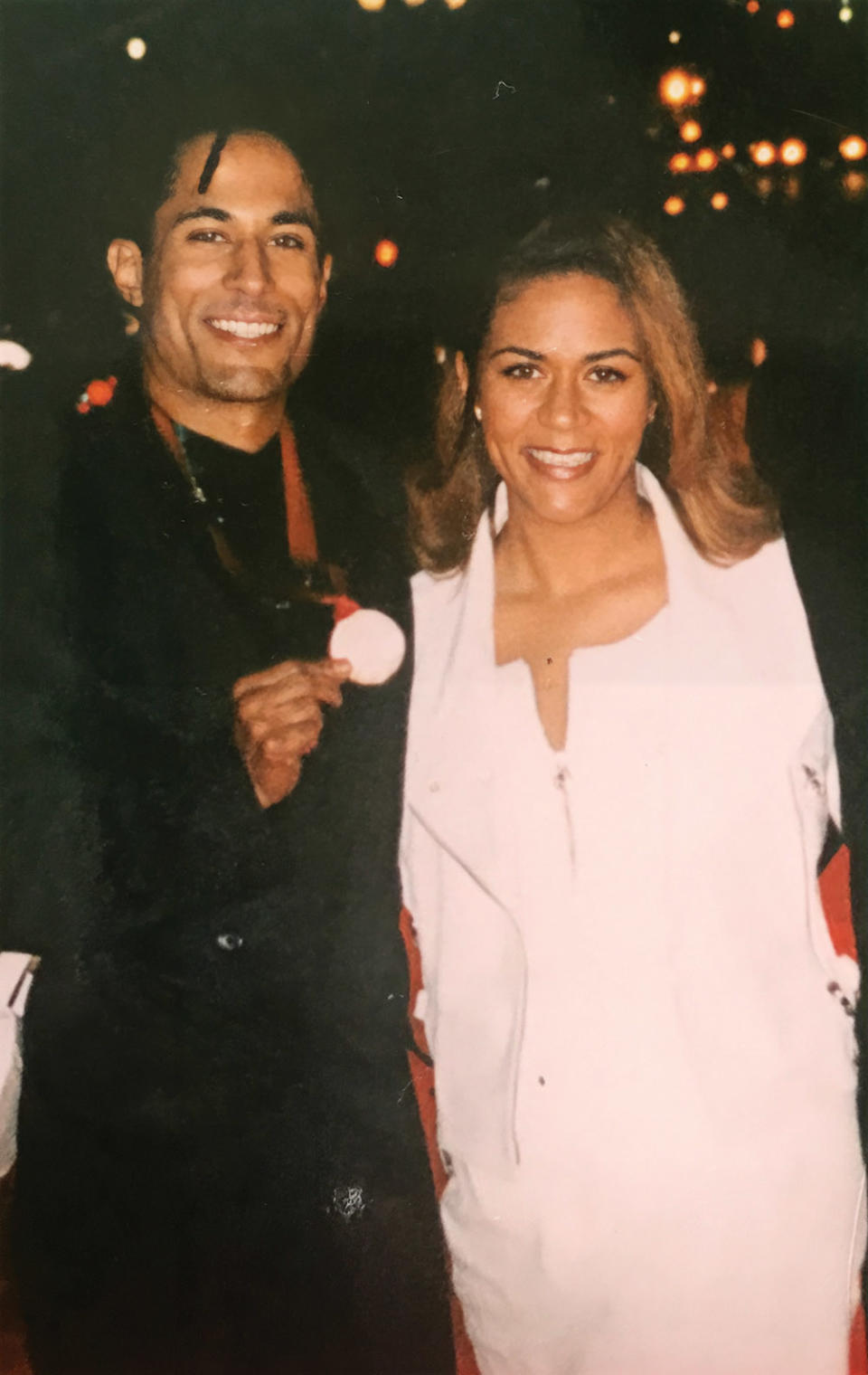
Shannon presented copious material to THR in her attempt to substantiate her position, including the assertion that while her father can appear acute in the span of an interview, it doesn’t capture what she and others close to him believe has been a diminishing day-to-day capacity. As evidence, she made available a 2016 hospital record in which a doctor made a preliminary assessment that John might have dementia. Shannon asserted, “I don’t want control of my father; I want a conservator.” (John later responded through a publicist: “I have never had an issue with my faculties including my speaking, writing, communications, work and living as a whole person with comprehension of my surroundings.”)
She explains that she left the entertainment industry and became a healer after a transformative experience involving her mother, which shadows and informs the current situation. In 1996, Noni — who’d long since remarried a Disney special-effects engineer and settled into a peaceful life on a ranch north of Los Angeles in Santa Clarita — became blind and a quadriplegic after a routine hysterectomy that went awry, resulting in an aneurysm, then a stroke. Her second husband, who successfully sued for malpractice, became a devoted caregiver. In 2005, he died from pancreatitis.
“I think he died from stress,” says Shannon. “One of my saddest moments was taking my mother to the hospital to take him off life support. She cried for days. She asked me at one point to put a plastic bag over her head.”
The siblings sharply disagreed over how to handle their mother’s widowhood. Shannon, by then a single mother, wanted to care for her in Atlanta, where she says she was considering a job opportunity. K.C., divorced and without children, wished to retrofit a property where he lived in Woodland Hills, at the western edge of the San Fernando Valley. Each of the proposed arrangements would be made possible by Noni’s malpractice settlement terms, paid monthly, as well as her own estate assets.
After a protracted tug-of-war, K.C. prevailed. Shannon contends that her brother skimped on their mother’s care, declining to hire overnight attendants even while he regularly left the home in the evenings. (“She would say that she would call out and nobody would answer, that she needed something and nobody would respond.”) Shannon also asserts that K.C. misappropriated Noni’s funds to help finance multiple low-budget films as well as for property renovations beyond the scope of her needs, including a pool featuring a grotto and a slide system — all claims that K.C. dismisses.
Shannon says her extensive outreach to police and Adult Protective Services proved fruitless: “The challenge I had was that I could not show enough of the paper trail.” She shared with THR a recording of a May 2021 conversation with her father in which he claimed he’d confronted K.C. about his son’s misuse of his ex-wife’s funds. By John’s accounting, his son admitted to the misdeed, which “blew me away.”
After Noni died in 2016, Shannon quit her Hollywood job and bought a one-way ticket to Bali, embarking on a yearlong, off-the-grid trip that led to her professional shift. She contends that Noni’s passing marked a consequential transition for K.C., too. A month after she died, a SWAT team disarmed him during what it took to be an acute mental health crisis, and he was placed on an involuntary hold at a local hospital.
At one point, Shannon reconciled with K.C., who she came to believe was a well-meaning but troubled figure. But they fell out again when, she alleges, she found illicit drugs in his car, which he denies. “This is not a sibling rivalry,” she insists. “This is about a sibling who is struggling with addiction and mental health issues and a co-dependent parent who can’t take care of himself and who is enabling him.” (K.C. denied that he’s struggled with illicit substances or psychological illness and expressed skepticism about the legitimacy of Shannon’s own serious medical challenges in recent years, which resulted in their father providing financial assistance. She responded: “Black women are constantly dismissed when it comes to health care. So I think it’s sick that he would question that.”)
Shannon says the relationship reached a new low earlier this year, when she learned that their father — whose health had been worsening — had been hospitalized once again while traveling with K.C. Over the preceding couple of years, he’d spent increasing time with John and in recent months seemed to her to be capitalizing on the closeness with his burgeoning TikTok presence. Shannon notes that John hadn’t been seeing his doctors as regularly as he should be, a rare point on which K.C. agrees, although he contends it’s not for lack of urging on his own part: “I let people make their choices. I believe in free will.”
By June, Shannon went public with elder abuse and neglect allegations. She also launched a GoFundMe campaign requesting up to $500,000 in assistance with “legal expenses, long-term care, ongoing medical treatment, and the costs associated with his recent hospitalization in another state away from home.” While the appeal was short on specifics and didn’t name her brother, it did say that donations would aid in “holding the perpetrator(s) accountable.” Yet after John — in a video that K.C. helped circulate — disavowed Shannon’s efforts and named her as the problem party, she took down her GoFundMe page and was left on the defensive. “I do not want or deserve to have my reputation dragged,” she says.
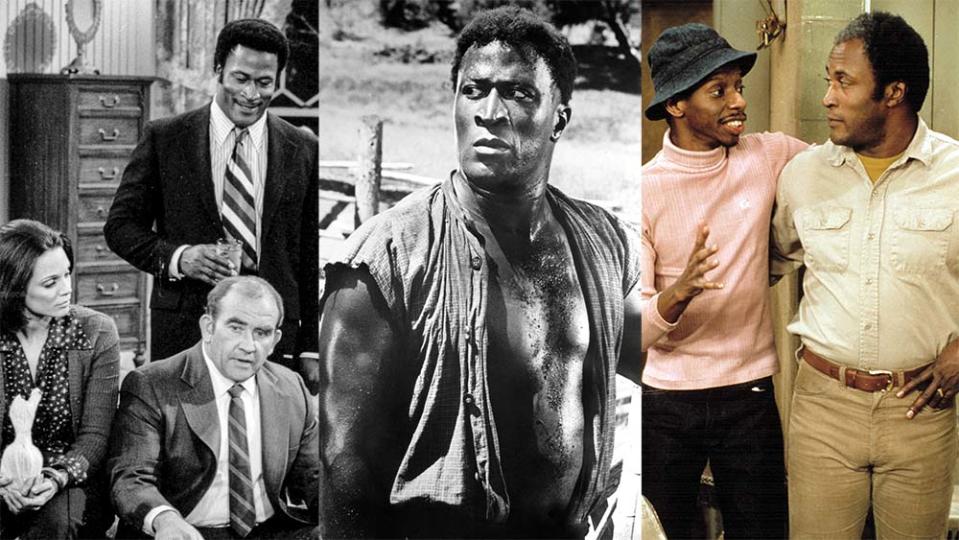
***
A week after THR met with his father, K.C. screened a rough cut of his two-hour documentary America’s Dad in a darkened hotel suite in Marina del Rey. It covers John’s early years, meteoric career rise and reconciliation with Good Times creator Norman Lear. At one point, John recalls a UFO sighting — “It was a light that appeared and took off” — and at another he’s shown accepting traditional cloth garments from the film commission in Monrovia, Liberia: “I feel like a kidnapped child who has been brought home. This is the biggest honor I’ve received in my career.” The film doesn’t delve into his private life; there’s little mention of his wives or kids.
Afterward, K.C. expressed bafflement about his sister’s allegations — that what he sees as his purehearted role in caretaking his mother has been recast as coldhearted; that he in any way misappropriated her money, which he denies; that he wouldn’t have his father’s best interest top of mind; and that his sister, whom he refers to only as “the other sibling,” has mounted such a vigorous, long-running effort not just to remove him from what’s become his managerial role in their father’s life but, as K.C. puts it, to “un-alive” him.
In this, K.C. points to Shannon’s proclivity for contacting law enforcement. “She’s called the police on me 24 times, until she finally succeeded in New Jersey,” he says. Shannon thinks that number is exaggerated, although she doesn’t deny it’s been a lot. She contends it’s “mostly been for wellness checks for my mom; whenever they showed up, he thought it was against him.” Nevertheless, K.C. casts Shannon as a hypocrite for marching in a 2020 Black Lives Matter protest about police brutality while initiating what he perceives to be unnecessary encounters that could have “eventually ended with me facing a similar fate as George Floyd.”
As for the New Jersey episode this past summer, he claims Shannon edited the texts that landed him in jail after he cut off contact so that they sounded like he was threatening her with guns when he was simply informing her about his ability to protect their father from the purported financial fraudsters who they believe pilfered from John’s bank accounts in Colorado — “a free-carry state. It was just, ‘Hey, nothing’s going to happen to our father.’ ” He also contends that Shannon’s recording of John acknowledging K.C.’s misuse of Noni’s estate had been “coerced,” explaining: “If you talk to my father late at night, and plant a camera, and start talking bad about a person, you can lead somebody and confuse them. She simply hid a camera and hacked it together.” (Shannon says she can’t speak to what put K.C. in a New Jersey jail because the court case is still pending, although she denies any records tampering.)
K.C. says his sister has engaged in a baroque crusade of character assassination in the hope of making him seem, as he puts it, “unfit.” This includes claiming that he’s emotionally unstable and has a dependency on hard drugs, when he only has an affinity for marijuana. “She’s some kind of self-proclaimed doctor, asking if I have Asperger’s,” he says, although he acknowledges that he operates on his own wavelength. “My video editor friends, we joke: ‘You have to be at least an outpatient to have that level of focus.’ ” As for the time he was involuntarily hospitalized, K.C. claims Shannon was responsible for getting it “into [his ex girlfriend’s] head that this was going to be a good idea to have me swatted.” To all of this, Shannon responds: “I feel bad for him. He’s really delusional.”
***
If nothing else, the amos siblings agree on the high drama of their shared tale. “My family story is such a movie,” Shannon says. K.C., considering if and how he might incorporate the latest chapter of John’s life into the final cut of America’s Dad, explains that John has “this proud trunk growing and then this other limb that’s gnarly.”
John is, by contrast, resistant to directly addressing his personal affairs. But he’ll allow that the challenges he’s privately faced as a father over the years since he played James Evans Sr. have deepened his capacity as an actor: “Every life experience I’ve had — the good, the horrible — has changed me for the better.”
This story first appeared in the Nov. 8 issue of The Hollywood Reporter magazine. Click here to subscribe.
Best of The Hollywood Reporter
Sign up for THR's Newsletter. For the latest news, follow us on Facebook, Twitter, and Instagram.